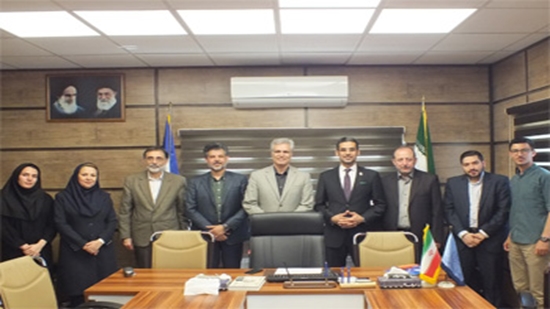The Office of Vice-Chancellor of International Affairs hosted Dr. Yasser Abdul Zahra al-Hajjaj, the Iraqi cultural advisor and his delegation


On May 23, 2018, the Office of Vice-Chancellor of International Affairs hosted an Iraqi delegation with the presence of Dr. Yasser Abdul Zahra al-Hajjaj, the cultural advisor of Iraq in Iran.
In this meeting, Dr. Faizi, the vice-chancellor of international affairs welcomed the presence of the guests in expressing the scientific and research capacities of the university and expressed his interest in developing bilateral cooperation. Also, he mentioned the conditions were right at the university to allow eligible Iraqi students to continue their studies at specialized and general levels or participate in short-term academic courses.
Dr. Yasser Abdul Zahra al-Hajjaj thanked Iran's medical universities for its contribution to the critical sitiuations in Iraq, and a significant contribution to Iraqi students, and in particular the activities of the Shahid Beheshti University of Medical Sciences as one of the best universities. Moreover, referring to the efforts of universities from other countries as rivals of Iranian universities, he pointed to the willingness of Iraqi students and their families to attend prestigious Iranian universities.
Dr. Haydar al-Nasar, the deputy of the Iraqi cultural advisor in Iran, confirmed his colleague's speeches to the challenges faced by students such as teaching in Persian and the difficulty of paying tuition in dollars, and this was one of the main concerns of students and their families. This has now been announced as a threat to the opportunity to attract Iraqi students to Iranian universities.
Dr. Faizi, while explaining the views and efforts on how to pay tuition, asked the representatives of medical and pharmaceutical faculties to express their views on the need to train international students in native languages.
Dr. Ali Tabibi, the dean of medical school, said that according to the nature of medicine and the need for effective communication between students and patients in most countries, teaching native language medicine courses is prefered. He stated that although the medical school has the ability to teach basic courses in English, the training of international students in native language, along with Iranian students, is helping to raise the level of cognitive skills, connecting international students and preparing them before their presence in the wards.
Dr. Alireza Mortazavi, the deputy of education of the faculty of pharmacy, confirmed the content of the new approaches in the field of pharmacy and the necessity of the students' interaction with the patients at the pharmacies. He mentioned an example of his experience in teaching international students, that a person who is more familiar with Persian language has been able to create better opportunities for himself. And since the prevailing terms of pharmaceutical specialization in Latin classes are introduced in classes, students' concern about teaching in Farsi was due to a low level of information and, in the end, suggested that, prior to the arrival of Iraqi students to Iranian universities, Persian language courses for six months or one year should be considered in order to increase the level of academic achievement of students. He also added that in the first two years of studying pharmaceutical students, classes are held in English.
The meeting was attended by Dr. Ghanati, deputy director of research at the Office of International Affairs, and Ms. Khalili, Education Specialist, and Mr. Hamed Zekaraksaz, Public Relations Officer and Mr. Mohammad Baqher Hakim, public relations officer of the Iraqi cultural advisor in Iran, and Ahmed Jamaloddinon behalf of medical international student.

Comment